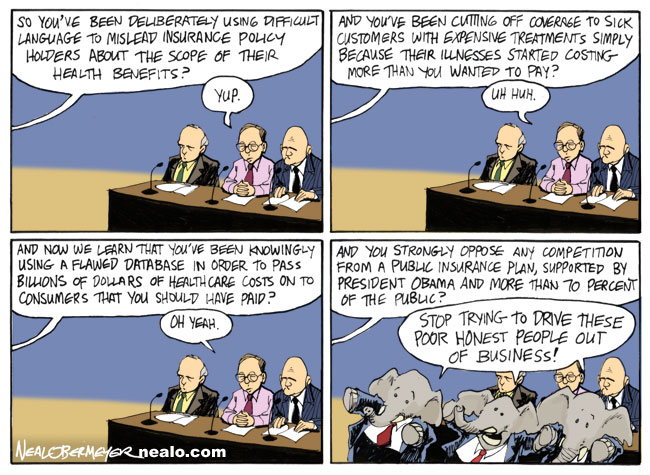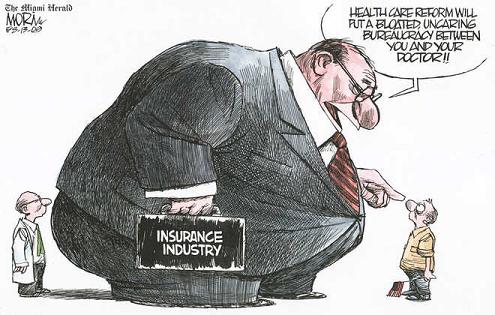I don’t know if the GOP is
lying to the nation or to itself but never has an American political party been
so eager to institute healthcare policy that will disenfranchise tens of
millions of citizens, thus consigning them to early graves.
They may justify the
curtailment of life-giving and life-preserving services because “non-paying
nerdowells don’t deserve government sponsored healthcare” but the upshot – as
certain as night follows day – is that countless Americans will fall under
death panel axes.
Here is a mainstream
Republican audience cheering the death of uninsured citizens. http://www.rawstory.com/rawreplay/2011/09/tea-party-audience-cheers-letting-the-uninsured-die/
Please not that the hospital
to which Ron Paul refers is a Catholic hospital, part of the only hospital
system in the United States that has always advocated universal care.
Here is the Vatican's view of
universal care which, according to Pope Benedict XVI will include significant
government-sponsored care. http://paxonbothhouses.blogspot.com/2012/04/pope-benedicts-plan-for-universal.html
***
The real death panels
January 1, 2011
During the debate over health
reform, Rep. Michele Bachmann (R-Minn.), Sarah Palin and others railed against
the "death panels" that would result from the bill. Government
bureaucrats, critics said, would decide who would die and when. The bill passed
- and indeed there are death panels. But they do not come from the Patient
Protection and Affordable Care Act, a.k.a. "Obamacare." They come
from Republican administrations in states such as Arizona and Indiana.
In Arizona, the government
headed by Gov. Jan Brewer summarily stopped approving Medicaid payments for
many organ transplants in October; one man had a liver virtually snatched away while
he waited to go into the operating room. He couldn't get it unless he came up
with $200,000 to pay for the procedure.
In Indiana, the state
Medicaid program denied a lifesaving operation last year to a 6-month-old boy
who lacked a thymus gland, which generates cells that the body uses to fight
infection. The Indiana Family Social Services Administration said the procedure
was "experimental" - even though it had been
successful in 43 of the 60 cases in which it had been applied. The state twice
denied the family's appeals, but fortunately the publicity caused by this case
prodded two health-care companies to pay for the $500,000 operation.
These are real death panels.
They are far from the Affordable Care Act's provision for end-of-life
counseling for families to enable them to make rational decisions about their
loved ones outside of the awful stress in a hospital or hospice. But these
decisions are not being made by evil people reveling in the anguish of patients
on Medicaid; they are the result of painful choices made by state governments
struggling with a sluggish economy, balanced budget requirements and soaring
Medicaid costs. States have to react, and one solution to their constraints is
rationing care.
In other words, the
nightmares of conservatives bitterly opposed to health reform are coming true
on two fronts, but with zero relation to the reform bill they opposed.
Things are about to get
worse. Nearly all states have balanced-budget requirements; many have stayed
afloat the past two years thanks in part to stimulus money, which is just about
gone. In addition, governors and state legislatures have used up the one-time
savings options or budget gimmicks, and they have already cut the fat, and in
some cases muscle, from their budgets. The only cuts left are hard ones,
usually in the areas that hit the most vulnerable. This means Medicaid first
and foremost.
There are, of course, many
ways to slash Medicaid budgets: cutting payments to providers, cutting benefit
levels, cutting procedures, cutting the number of recipients. Another approach,
at least considered by Texas Gov. Rick Perry (R), is to eliminate the Medicaid
program and give the state unfettered freedom to design its own starkly limited
health-care plan for the poor.
But each approach has severe
drawbacks. Provider payments for Medicaid are already so low that many
health-care providers shun the program. Cutting benefits or cutting programs -
which inevitably will mean aiming at the most expensive ones - will lead to
bureaucrats making life-and-death decisions based on money alone, and it will
include perversely stupid budgetary decisions. Transplants save money and lives
compared with the other options, but the savings are seen in the long term,
while state politicians are thinking of how they can balance their budgets this
year.
As for the Texas option, it
would require giving up a huge slice of federal dollars that subsidize
Medicaid, with no source of replacement. Texas is already stingy when it comes
to aid for the poor; this move would probably result in increased pressures on
already overburdened hospital emergency rooms and, worse, back-alley births.
This is not a future
scenario. The dilemmas of state governments are here now. The same kinds of
pressures have been building for years in nearly all public- and private-sector
health programs as rising costs have to be met by measures to contain them,
which means some form of rationing, whether done by employers, health insurers
or others. The Affordable Care Act was spurred by these mounting pressures and
included, in one form or another, nearly every idea for containing costs
without resorting to the blunt instruments Arizona and Indiana are using. Those
cost-retarding programs and vehicles are near the top of the incoming House
Republicans' hit list for the health-reform legislation. They may want to
rethink their repeal efforts even as their counterparts in states are rationing
up a storm.
Norman J. Ornstein is a
resident scholar at the American Enterprise Institute and co-author of
"The Broken Branch: How Congress Is Failing America and How to Get It Back
on Track."


Most Americans believe that legislation
other than Obamacare prevents private insurance companies from denying coverage, dropping coverage and refusing to insure children on parents' policies between the ages of 18 and 26. Not of these assumptions are true. If Obamacare is overturned by the Supreme Court, an already moribund system will begin to putrefy. Absent Obamacare, every American will soon have a loved one (or the loved one of a loved one) who will be physically damaged from lack of insurance coverage.


Alan here... A recently-retired
conservative physician friend (recently retired) tells me he employed a
full-time secretary to hassle with tight-fisted insurance companies and that he
himself spent four hours a day negotiating needed healthcare for his patients.
Alan here... The GOP will soon be at the forefront of cost-cutting healthcare policies that dig early graves for tens of millions of Americans. It has already happened in Arizona and Indiana. In the toss-up between tax cuts and cutting someone's throat, the GOP always votes to "cut."
"The Real Death Panels"
No comments:
Post a Comment